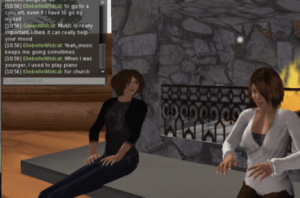TUCSON, Ariz. — The reputation of social media has taken a huge hit in recent years as a growing number of commentators have argued that interactive sites like Facebook, SnapChat and Instagram have failed to create lasting and meaningful bonds among users, instead substituting an empty virtual interface for genuine friendship and intimacy.
But for niche users, especially those without the ability to meet like-minded souls and spirits across a vast distance, issue-focused web-based communities can fill a real emotional or intellectual void, other analysts suggest.

A recent study of grieving spouses that met weekly in a web-based chat room to share their emotional challenges suggests that online support groups may have real healing potential because they allow participants to tap into their deepest feelings and to open up to similarly-situated strangers in a safe, confidential setting.
The study, led by Lindsey Knowles, a graduate student in clinical psychology at the University of Arizona, compared the impact of two different online resource systems on a convenience sample of roughly three dozen widows over 30 and widowers over 50.
In one system, the users were asked to spend an hour reading literature on grief-related topics from a designated website. In the counterpart system, users actually “met” twice a week in a virtual representation of a support group, even assuming the identity of specially created animated characters – known as avatars — to engage each other in discussion about the same topics presented on the web site.
Knowles and her team tested whether the sessions were meaningful for participants at the conclusion of the 8-week intervention, and also two months later. Users of both resource systems reported better sleep and less stress and loneliness after the intervention. However, only participants in the virtual interactive support group demonstrated a real decline in their depression, the researchers found.
“There’s something to be said for getting into a group and showing up for that group every week, as well as being able to share your experience in a validating and normalizing environment,” Knowles says in a UA press release.
Participants in the virtual support group found that they were able to get in touch with their innermost emotions in real-time, and that the group’s shield of anonymity may have made it easier than it would have been in a live support group, Knowles says.
The fact that the non-interactive web-based resource also impacted the lives of users is an important finding, Knowles adds. Virtual support groups, which require an active moderator and substantial resources to organize and maintain for the length of the intervention, may not be available to many grieving spouses who still need a way to understand what they are experiencing, and to know that they are not alone.
Knowles hopes that future studies will involve more rigorous methodological controls that will allow researchers to compare the impact of virtual and live support groups. The population is getting proportionately older and the number of grieving spouses is likely to increase in the years ahead, she noted.
“With the graying of America… we expect that more people are going to be widowed as baby boomers age,” Knowles says. “Losing a spouse is a huge life transition and a profoundly stressful event. All of us will experience different types of grief in our lives, and having accessible resources that are evidence-based is really important.”
Knowles conducted the study with her colleague Mary O’Connor, who has previously organized virtual support groups for Alzheimer’s and dementia patients. Their findings will be published in the journal Computers in Human Behavior.

Comments
Comments are closed.